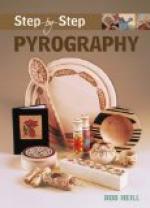The sleepy guard let them out without a look, and they rode on at a good pace toward the mountains. Josian had not said one word.
“Are you afraid, Princess?” Alan asked presently.
She shook her head. When she heard the story of the jester’s death she was less shaken than Alan had feared. “He told me last night that he could not live long,” she said sadly. “I knew that I should never see him again in this world.”
At last they halted for an hour beside a little spring. Josian looked back at the gray pointed roofs and towers of Goslar. “Al-an,” she said, “what was that light in the sky?”
“It was your tower,” Alan answered. “No one will ever live there again, since you cannot.”
Alan marveled at Josian’s self-possession during the rough journey. She obeyed orders like a child, showed no fear in the most perilous passes, and fared as roughly as the others did, with quiet endurance. Soon, however, they had crossed the frontier and met the party of travelers in whose company were the London merchant and his wife and son.
Then began days and weeks of travel, the like of which Alan had not known. He had gone from one place to another in such company as offered, many a time, but here were folk who knew every road and every inn, beguiled the hours with songs and jests and stories, and made the time pass like a holiday. He found that his knowledge of the out-of-door world interested Josian more than the ballads and tales of the others. He often rode at her side for an hour or more, pointing out to her the secret quick life of woodland and meadow, and finding perhaps that she already knew the bird, squirrel, marmot or hare, by another name. “London is well enough,” he said one day, “but ’tis not for me. I could never live grubbing in the dark there like a mouldiwarp.”
Josian’s delicate brows drew together. “Mouldi—what strange beast is that, Al-an?” and Alan laughed and explained that it was a mole.
It was at noon of one of the long fragrant days of early summer, while the travelers rested in the forest, that Josian spoke of the jester once more. In the green stillness of the deep woods, birds singing and shy delicate blossoms gemming the moss, the fierce and savage past was like a dream.
“Father Stephen gave me a packet that last night,” she said. “He gave Giovanni gold for the journey, but this parcel he said I must carry myself and show to you when I thought fit. I wonder what it can be?”
Alan took the packet and turned it over. It was sealed with a device of Greek letters.
“That is my father’s signet,” the girl added. “Here is his ring,” and she drew from under her bodice a man’s ring, hung on a slender gold chain, the stone a great emerald carved with the Greek “AEI”—“Always.” Alan cut the cord of the packet and handed it to her. “It is not for me to open it,” he said.
She unfolded, tenderly and reverently, the wrappings of parchment and oiled silk, and disclosed a compact manuscript closely written on the thinnest leaves, in a firm clear hand. Lifting two or three of the pages she read eagerly and then looked up, her eyes alight with wondering joy.




